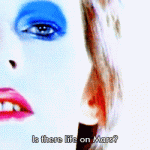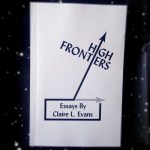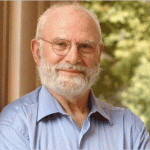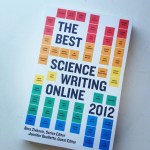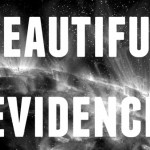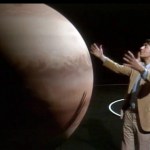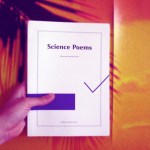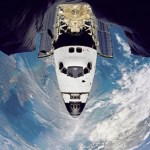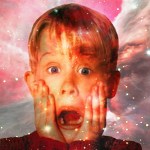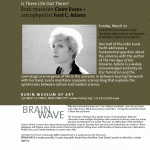Happenings
You certainly didn't hear it here first: today NASA, at a press briefing, announced that minerals analyzed by the Curiosity rover indicate that life might, in the galactic past, have survived on Mars. The rover's been poking around an ancient network of stream channels descending from the rim of Gale crater since September of last year; now, after drilling into the sedimentary bedrock nearby, it's hit on a treasure trove of life-supporting minerals: carbon, oxygen, hydrogen, phosphorus, sulfur, and nitrogen. These mineral findings are really just icing on the cake, as the geological…
Writing for the Internet is like yelling into the void: freeing, probably more than a little cathartic, but ultimately lonely. That's not to say that I haven't made profound connections out here, but like most writers I long for a little thing with my name on it that fits in the hand, that can be passed around and earmarked, tossed away and re-discovered.
Which is why I'm so pleased to announce the existence of precisely such a little thing: my brand-new collection of essays and arcana, High Frontiers, fresh from the presses of Publication Studio:
High Frontiers brings together…
I probably don't need to introduce Oliver Sacks to you. You've undoubtedly already delighted over his wobbly affectation and tales of neurological strangeness on RadioLab or NPR. You might have read his lovely first-person account, in the New Yorker, of his early experiments with hallucinogens of all stripes, from the "pharmacological launch pad" of amphetamines and LSD, to the synthetic belladonna-like drug, artane. You may even have read one of his bestselling books of clinical studies, like The Man Who Mistook His Wife for a Hat or Awakenings.
I interviewed Dr. Sacks in 2007, on the…
I've been practicing little idiosyncratic rituals on this corner of the web for years: learn something new, obsessively research, get lost in the idea, scribble, converse endlessly, then write. This blog, Universe, has never been about garnering hits or materializing an audience because, for me, thinking and writing about science is a personal tic. I can't help but yell into the void; I understand science as a poetic language for explaining reality, and when I see changes in that language all I want to do is unfasten myself into them.
I definitely don't seek any form of recognition for what…
To scientists, "experimental" is a technical word, one with a precise meaning: that which relates to a procedure of methodical trial and error, to a systematic test for determining the nature of reality. I got in trouble on this blog once, with commenters, for using the word "experimental" too flippantly.
But artists experiment too, of course. Their method of inquiry is different, free from the rigidity that characterizes the scientific method. Artistic experiments are designed to be singular; they aren't supposed to be repeated. They have no control variables. Often, even the…
Ed: This is an essay I wrote for my friends at the World Science Festival, riffing on the central themes of this years' event. If you prefer, you can also read this piece on the World Science Festival site. And, if you're in New York between the first and fifth of June, you could do much worse than popping into the Festival and getting a load of panel discussions like The Dark Side of the Universe, or Science & Story: The Art of Communicating Science Across All Media.
Science communication is difficult.
It can be crippled by the complexity of its own subject matter. It can be steeped in…
Earlier this year, I received a charming email from a pair of Helsinki-based artists and designers who work under the name of OK DO. OK DO is a socially-minded design think tank and online publication; they dug Universe and wanted to know if I'd contribute to a new publication and exhibition project they were working on. The project, Science Poems, was perfectly up my alley: a variety of articles and work loosely structured around the "poetry and multi-sensorial aesthetics of natural sciences rather than their functionality and logic."
For the occasion, I wrote a short piece about the…
Last week, fresh off the fourth-to-last Shuttle mission, STS-131, NASA astronaut Jim Dutton came to speak at OMSI, my local science museum. When I got the email about this event, I RSVPed immediately -- after all, an astronaut in my town? How urbane. Surely the intelligentsia of Oregon would come in droves to discuss the boggling phenomenological experience of spaceflight and the uncertain future of NASA with one of our nation's "right stuff." As usual, I was wrong; the only adult in the museum unaccompanied by a least one small child, I felt somehow like a pervert, as though the harried…
If it has always been your fantasy to send your physical likeness out into the cosmos, now is your time! To commemorate the final two Shuttle missions, NASA has created a bonkers "Face in Space" initiative, which allows you to upload a picture of yourself to send to the International Space Station. What this actually entails, I imagine, is a burned data DVD in an astronaut's backpack -- nominal space travel if I've ever heard of it.
It's fun, and my face is already destined to launch on September 16th on STS-133; but, seriously, what is this about? Rousing public interest in the space…
A large part of my affection for science comes from the thrill of terror I get when a particularly insane piece of science news hits the presses. When an article begins with a sentence like, "there is something strange in the cosmic neighborhood," or "all the black holes found so far in our universe may be doorways into alternate realities," my pulse quickens and a dormant paranoia is roused from deep within my breast: a sensation of joyful panic. I used to call this the "fourth-grade nightmare fantasy." This might be because as a long-time science fiction adept, I tend to read science news…
I'm flying out to New York City on Sunday to participate in the very exciting BRAINWAVE series at the Rubin Museum of Art. BRAINWAVE, which is in its third year, brings thinkers from different disciplines to sit down with scientists to wrap their (and our) minds around the things that matter. Past pairings include Composer Philip Glass and astronomer Greg Laughlin, screenwriter Charlie Kaufman and physicist Brian Greene, and performance artist Laurie Anderson with astrophysicist Janna Levin. Needless to say, it's a fascinating series, and I'm honored to be involved.
I'll be talking with…
